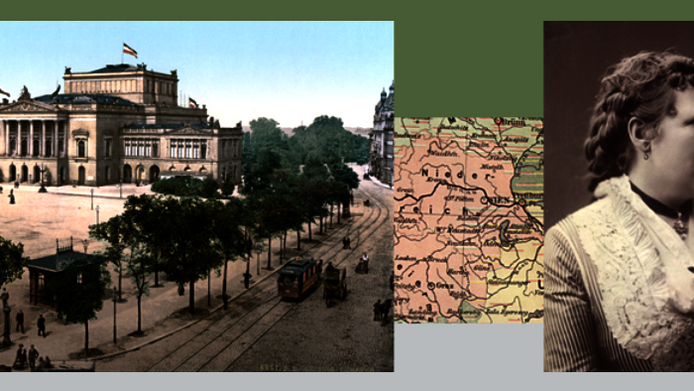Women’s voices against prejudice under the monarchy

In the Habsburg Monarchy, it was uncommon for women to get or actively seek good education, become writers and find a readership for their works. It came as a surprise therefore when Alexandra Millner from the University of Vienna found a considerable number of women writers, no longer known today, who were extremely productive during the time of the Dual Monarchy in a project Millner conducted with the support of the Austrian Science Fund FWF. These women had experienced migration, frequently wrote against the grain of mainstream society and sometimes enjoyed a large readership. In her previous research, this German studies scholar had noticed that women who migrated often changed their take on society. Starting with well-known women writers such as Bertha von Suttner, Ada Christen or Marie von Ebner-Eschenbach, the Elise-Richter grant holder, who works at the Department of German Studies, discovered about 200 women authors active in the period between 1867 and 1918: early, sometimes subversive, female voices that managed to gain a hearing despite censorship.
New database revises literary canon
Together with Katalin Teller from the Eötvös-Loránd University Budapest, Millner vetted standard works on literary history, digitalised historical literary journals, databases (e.g. Ariadne www.onb.ac.at/forschung/ariadne-frauendokumentation/) and library records and discovered unjustly forgotten names. “Digitalised journals are a blessing for us, especially since many women never made the transition from contributions to journals to writing their own books”, stresses Millner in the interview with scilog. From the wealth of material found she selected five women whose biographies she investigated in more detail. The publicly accessible database, www.univie.ac.at/transdifferenz, now contains information on each of the newly discovered writers’ names and/or pseudonyms, biographical data, migration movements, books and contributions to literary or cultural journals, as well as links to digitalised material. The results of this basic-research project have led to a valuable extension of the literary canon. The women experienced many different variations of migration: e.g. from the periphery of the monarchy to its capital city Vienna, the other way round, into exile, with a mother tongue other than German, voluntary or forced, well-off or destitute. These authors were often aristocrats or bourgeoise; they were teachers, writers, actresses, workers or journalists. Many of them started writing because due to the Long Depression they suddenly needed an income. German as the official language was what they had in common with their readership, for the Habsburg Monarchy imposed a strict form of what would today be called Leitkultur or “dominant culture”. Against the background of industrialisation and growing literacy, a much wider range of daily newspapers and journals was published and read during that time than today. Written texts were increasingly the chosen medium to circulate political ideas. Within the context of her Elise-Richter grant from the FWF, Alexandra Millner wanted to revise the literary canon: “I noticed that many women who had migrated from the periphery to the centre wrote differently from those women writers coming from the centre of the monarchy. This is certainly due to the intensity of their migration experiences which made them eager to write things down and express themselves. And it leads to a less prejudiced way of seeing things.”
Transdifference – outgrowing prejudice
In order to explore the subversive potential of these female voices, Alexandra Millner screened their output for deliberately incorporated “moments of transdifference”. Transdifference is the deviation from or transcendence of qualities routinely ascribed to persons because of their social belongings (involving categories such as gender, religion, language, social stratum, profession or generation). The German studies scholar developed a method “to discover deviations in comparison to widely read literature in the Dual Monarchy and the characters featured therein”, reports Millner. “I was struck by women writers who used popular character stereotypes such as ‘the Bohemian maid’ or ‘the young gipsy girl’, but gave them a different slant.” One example is a narrative by Eugenie Marie delle Grazie, a naturalist and salonnière whose publications were well known at the time. In this tale she invests a young Roma girl not with stereotypical qualities such as being beautiful, wild, seductive or wily, but presents her as an innocent character of high moral integrity. In a conversation with her former nurse the young story-teller also scolds the nurse for being negatively biased against Roma. The researcher also found that subtle literary voices became louder in the wake of major emancipatory movements such as the French Revolution or the abolition of slavery in the USA and in the course of the empowerment of women and the working class. In addition, the database demonstrates that migration is an inherent part of the history of humankind. Experiencing life in different places sharpens the critical perception of stereotypes and biases. And looking back on historical literature sheds new light on today's literature about the experience of migration.
Personal details
Alexandra Millner conducts research in the Modern German Literature branch at the University of Vienna’s Department of German Studies. She studied German Philology, English and American studies as well as art history and acquired her PhD in German Philology. Her specialty areas are literature and culture from the 19th century onwards, particularly in the Habsburg Monarchy and contemporary literature. Within the context of another FWF-funded project, she is currently editing the plays and radio plays of the Austrian writer Albert Drach (1902–1995).
Project database: www.univie.ac.at/transdifferenz
Publications
Alexandra Millner, Katalin Teller: Auf Reisespuren in Bertha und Arthur Gundaccar von Suttners Literatur. In: Johann Georg Lughofer/Milan Tvrdík (Hg.): Suttner im KonText. Interdisziplinäre Beiträge zu Werk und Leben der Friedensnobelpreisträgerin. Heidelberg: Winter-Verlag 2017, S. 45–73
Alexandra Millner, Katalin Teller (Hg.): Transdifferenz und Transkulturalität. Migration und Alterität in den Literaturen und Kulturen Österreich-Ungarns. Bielefeld: transcript Verlag





